Two-time USSR champion, one of the main heroes of the 1945 tour of Great Britain.
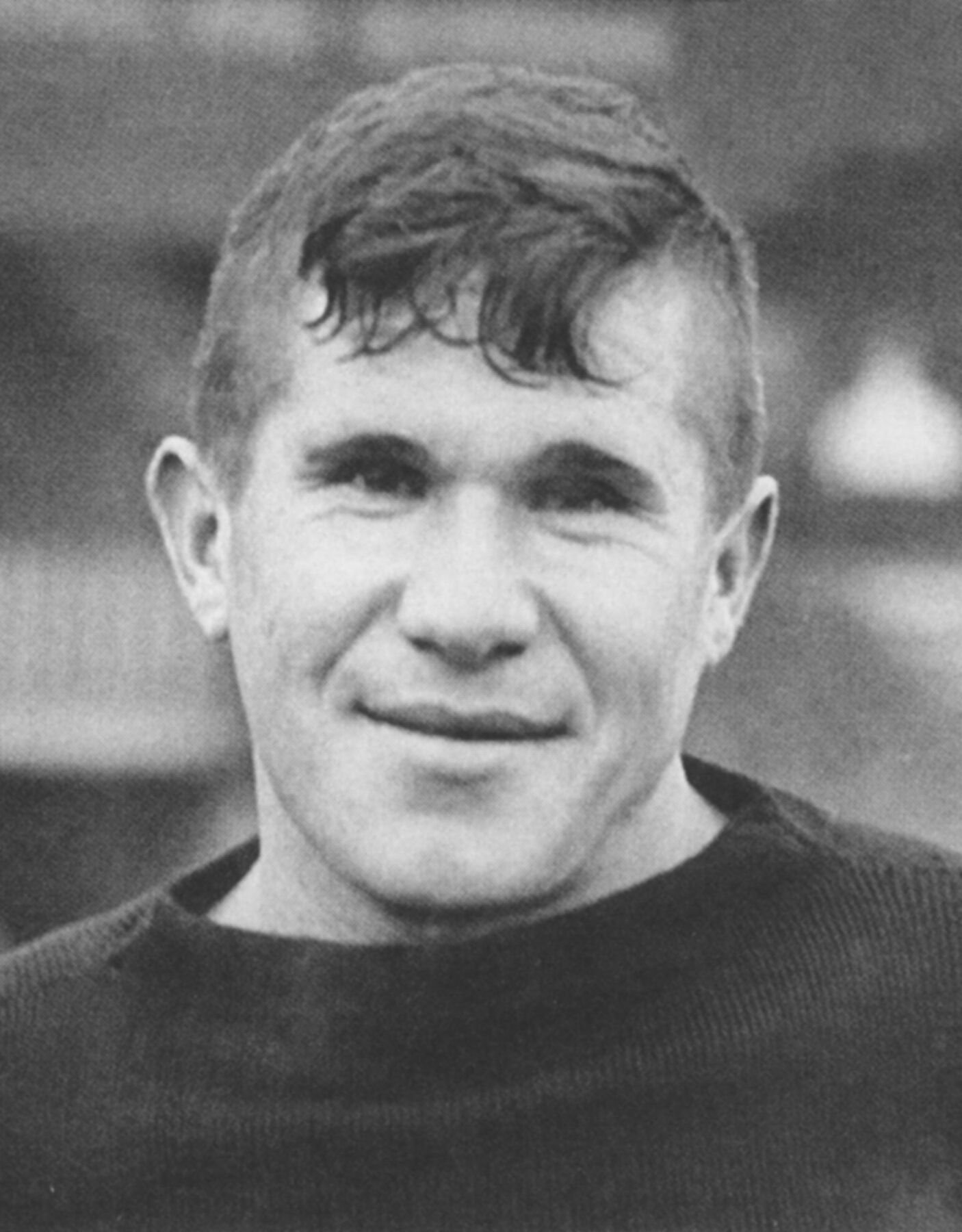
Player flight statistics:
0 flights
0 hours in the air
Alexei Petrovich Khomich was born on March 14, 1920 in Moscow. He lost his father early and was raised by his mother, who did not encourage his passion for football. From early childhood, Khomich was involved in sports: gymnastics, swimming, diving and volleyball. The skills he acquired later greatly helped him in football.
The football career of the future Dynamo legend began in Tagansky Park. When he played for the district volleyball team, he was noticed by the captain of the local football team, Yan Grodnitsky. They were starting a match with the team of the Serp i Molot plant, and there was no goalkeeper. He offered to fill this position to Khomich.
The leader of the Serp i Molot team at that time was young Konstantin Beskov. But no matter how hard he and his partners tried, they could not beat the young goalkeeper. But a few minutes before the end of the match, a funny incident occurred. Having caught the ball in his penalty area, Alexei dropped his cap, and when he went to pick it up, he stepped over the goal line. So the match ended in a draw. Despite this, Khomich soon found himself on the second team of the Tagansky district.
In 1936, the Tagansky District team won the championship among Moscow parks. After the final match, Alexei was invited to the factory team "Boets", which played in class "B" of the national championship. In it, Khomich was under the patronage of the future goalkeeper of CDKA and the USSR national team Vladimir Nikanorov.
A close friendship developed between them. During the war, both were in Moscow and played for their teams in the city championship. And in the first post-war five-year plan, the rivalry between the two departmental clubs, for which the goalkeepers played at that time, became a cult for Soviet football. After the first derby on July 22, 1945, Khomich and Nikanorov developed a tradition of congratulating each other on victories, which they never changed.
In 1940, Khomich was drafted into the army and sent to the border of Turkey and Adjara. Despite the fact that it was the second year of the World War, there were no provocations on the border itself, so the border guards could devote their free time to sports.
After the start of the Great Patriotic War, Khomich, like many other athletes, was enrolled in a separate motorized rifle brigade of special purpose of the NKVD. At the same time, football tournaments in Moscow did not stop. The team for which Khomich now played belonged to the Dynamo society and played in the tournament of third club teams. Soon he was noticed in the team of masters, where his old friend Beskov was already shining.
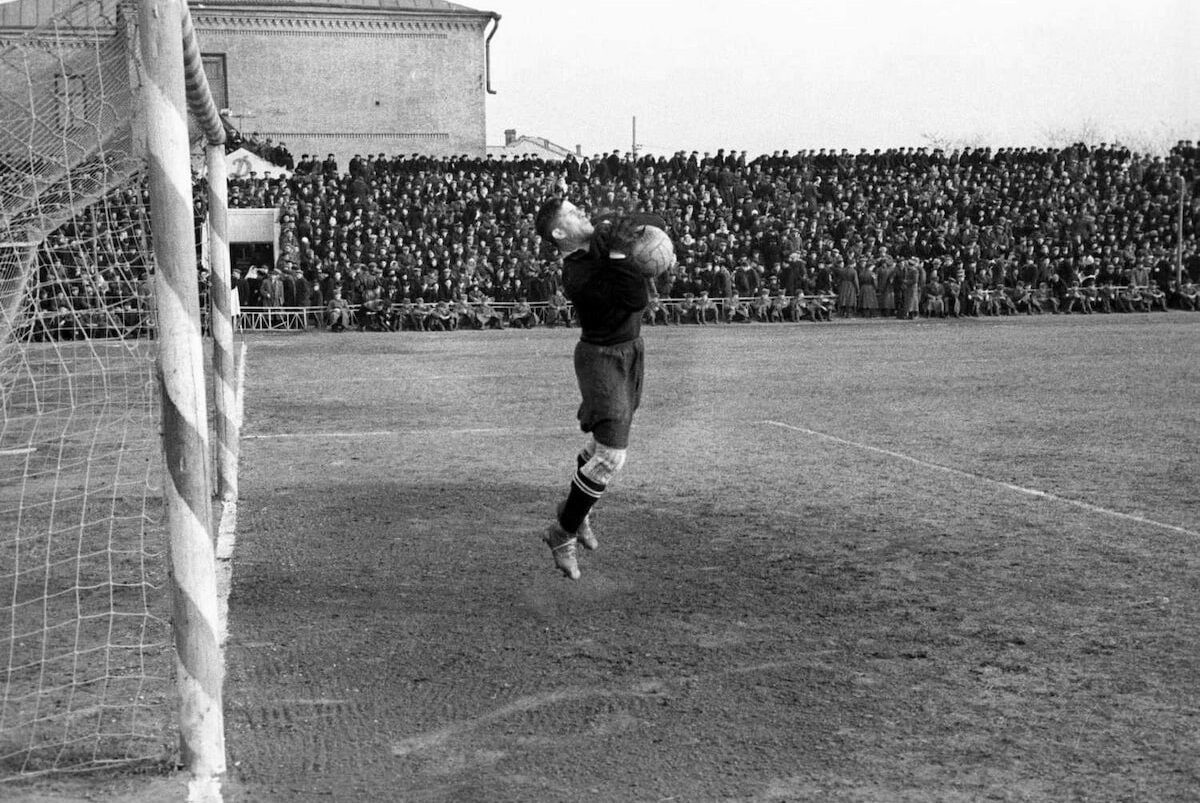
In 1944, the Dynamo coaching staff decided to bet on the young goalkeeper. In his first four games, Khomich missed eight goals. But head coach Mikhail Yakushin believed in Alexei and worked with him a lot individually, eliminating his shortcomings - stiffness, nervousness and instability. The coach advised the goalkeeper to take walks in the fresh air before games. At first, he himself went with Khomich to the forest to look for mushrooms and berries, and over time this became a pre-match ritual for the goalkeeper.
"Alexei made me happy with his hard work and some amazing dedication. Behind each of his jump, which caused sincere admiration of the spectators, there was great work, bordering on a feat," said Yakushin.
Khomich gained recognition in 1945. In 20 matches of the USSR championship, he let in only 12 goals, while keeping eleven clean sheets. The Dynamo players won the championship for the fourth time and were preparing to go on vacation when an invitation came from Great Britain to play a series of friendly matches.
Instead of resting, Khomich and his team went to the base in Mytishchi. There they spent the last three weeks before flying to Britain, where they were to play four matches.
In the first match of the tour, the blue-and-whites faced Chelsea. The Londoners scored two goals and could have brought the score to a rout already in the first half, when Khomich made his famous save. According to Yakushin, it was for this jump that the goalkeeper received the nickname "tiger". The Dynamo players seized the initiative in the second half and finished the match in a draw - 3:3, and Khomich was carried off the field by the fans.
Honorary chairman of Chelsea Lord Alexander was so delighted with Khomich's play that he offered him to move to the English team and determine the contract amount himself. In response, the goalkeeper simply stated that he was not for sale.
"The most indelible impression in Dynamo was left by Alexei Khomich. When he was successful in the match, it seemed that it was impossible to score. And what was he doing in England! Khomich was a goalkeeper with amazing reactions, an incredible, cat-like jump. It was not for nothing that they called him a tiger,” recalled defender Vsevolod Radikorsky.
After returning to his homeland, Khomich was awarded the title of Master of Sports. With him, Dynamo won silver medals four times, and in 1949, they won the championship again. In subsequent seasons, Khomich began to appear in the starting lineup less frequently, which was facilitated by an injury and Yakushin's departure from the post of head coach.
Over time, Khomich himself became a mentor for young Dynamo goalkeepers. His first protégé was Walter Sanaya, who transferred from Tbilisi Dynamo. But due to disciplinary problems, he never became the club's main goalkeeper, but his next student forever entered the history of world football.
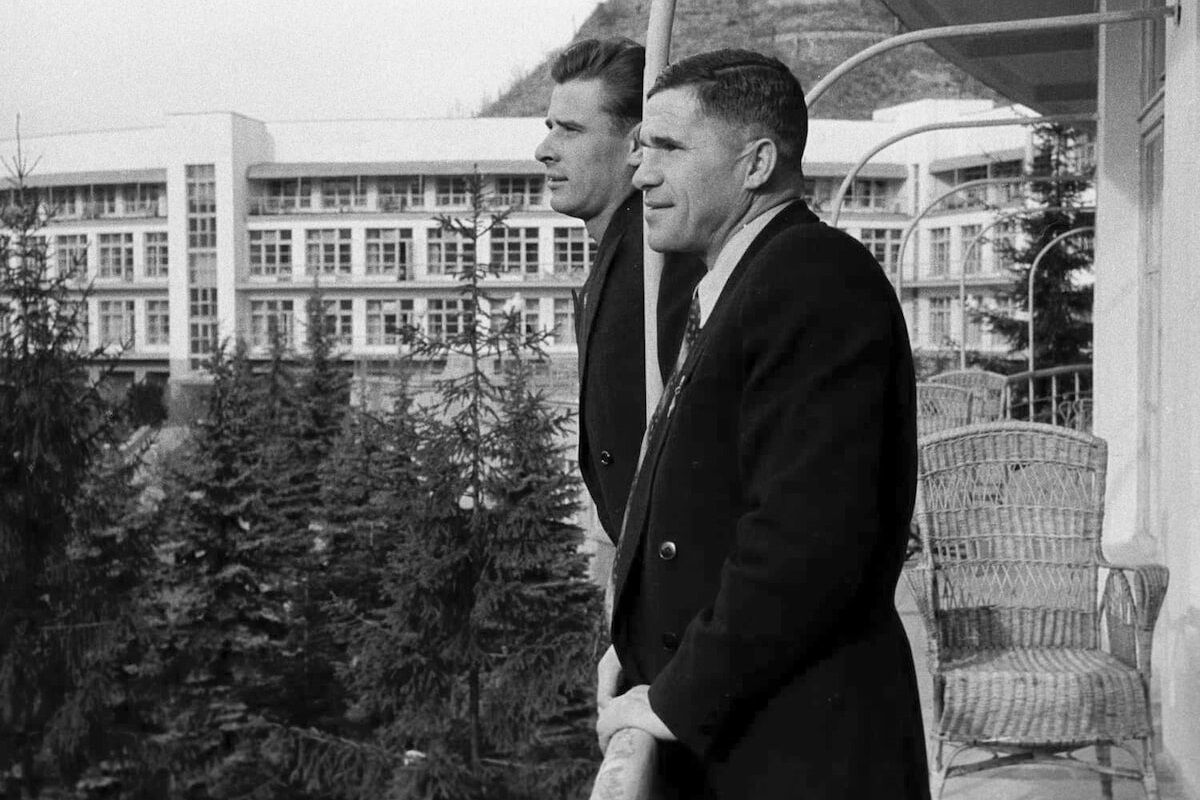
Khomich immediately established contact with Lev Yashin. He introduced the future owner of the Golden Ball to the goalkeeper training system that he himself had once mastered under Yakushin's guidance. Even after leaving Dynamo, Alexei Petrovich continued to support his younger colleague.
"I carried my idol's suitcase, sat next to him when he changed, stood behind his goal during games. And he also did not leave my goal when the reserves played, and did not skimp on advice and instructions. I proudly consider him my main teacher, who passed on to me a responsible attitude to work, who instilled in me his determination and devotion to the game," Yashin recalled.
After finishing his playing career, Khomich could not part with sports. He went to study at the House of Journalists and eventually became a photojournalist for the weekly "Football". He worked at major international football tournaments - the World Cup, European Championships and the Olympic Games. His last major competition was Euro 76 in Yugoslavia.
Khomich also took direct part in organizing the children's tournament "Leather Ball", which was created on the initiative of Lev Yashin in 1964. Alexei Petrovich held the awards ceremony for the winners of the first competition at the Dynamo stadium, and then spent the rest of his life organizing the tournament.
"Football is wonderful in itself. But if you came to it only to glorify yourself and not your team, leave. You will turn it into a boring craft. When I feel that the team has outgrown me, I will immediately leave. We have no right to be a burden for the team. Because it’s not us who make it masters, but it makes us masters,” said Khomich.
"Dynamo Constellation" is a unique project launched on the day of Alexey Khomich's 100th anniversary in March 2020. Based on the results of the fan vote, the final roster of 11 outstanding Dynamo players was formed. During 2020 and 2021, 11 stars included in the constellation were named after legendary Dynamo football players: Alexey Khomich, Lev Yashin, Mikhail Yakushin, Konstantin Beskov, Mikhail Semichastny, Igor Chislenko, Sergei Solovyov, Valery Maslov, Viktor Tsarev, Igor Dobrovolsky and Alexander Novikov.
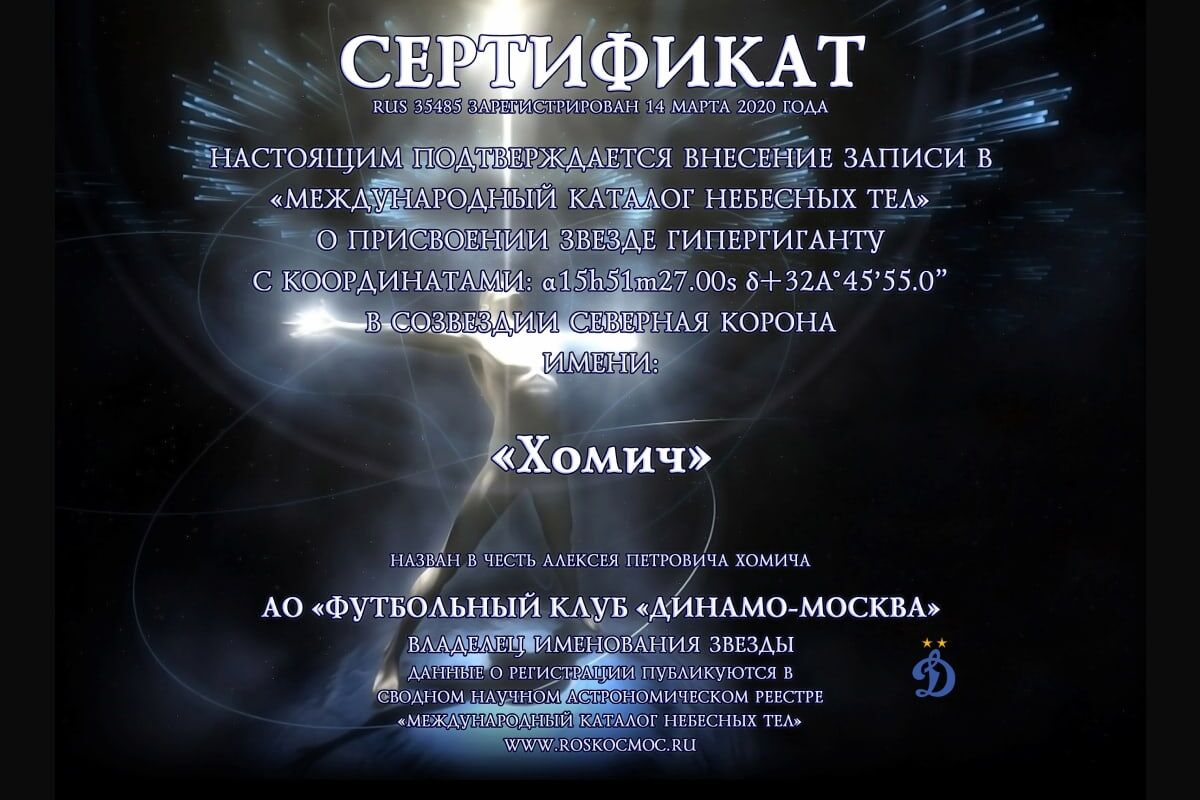
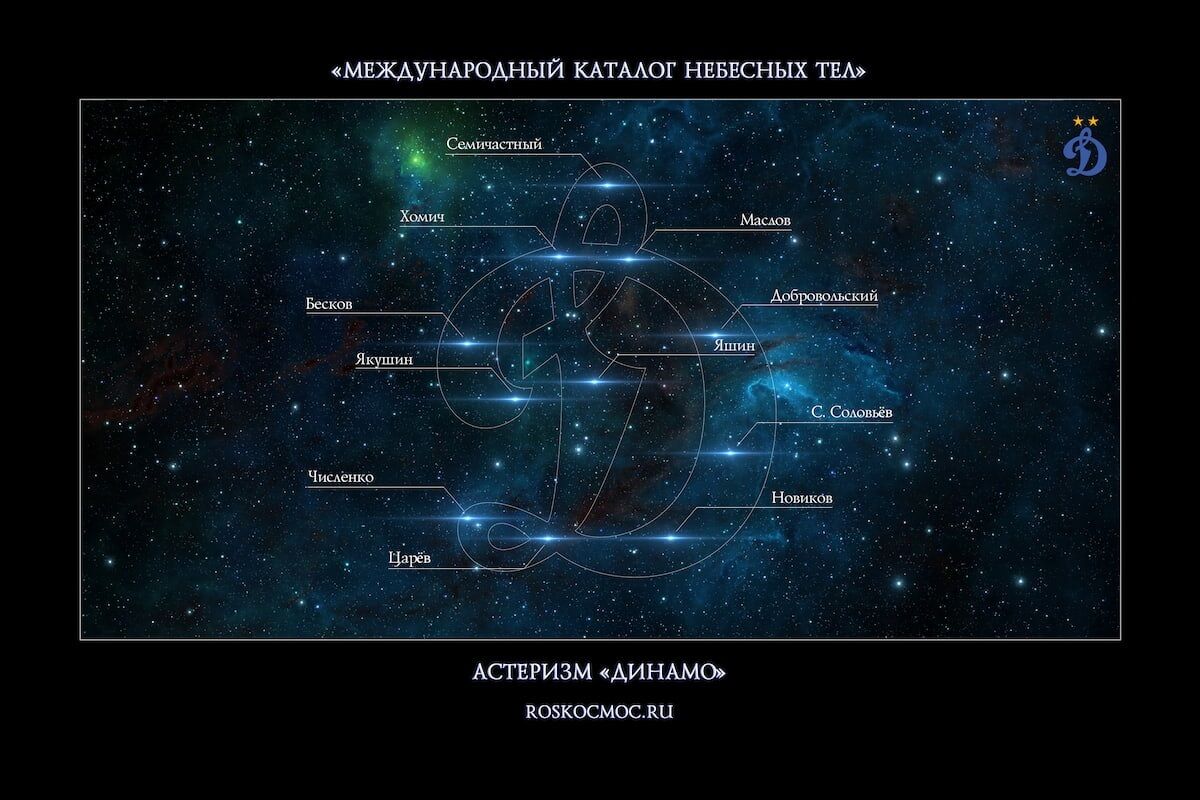
Career








Achievements
Video
No content yet
Photo
No content yet